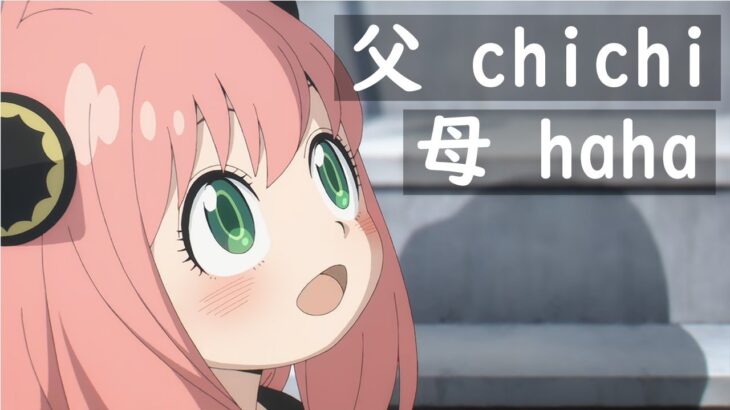【視聴数 522758】
【チャンネル名 That Japanese Man Yuta】
【タグ 動画,ビデオ,共有,カメラ付き携帯電話,動画機能付き携帯電話,無料,アップロード,チャンネル,コミュニティ,YouTube,ユーチューブ】
SPY×FAMILY★youtubeまとめたサイト スパイファミリー関係のyoutube動画リンクをまとめました!スパイファミリーのチャンネル探しに便利です!最新の役立つスパイファミリー情報があります!

【視聴数 522758】
【チャンネル名 That Japanese Man Yuta】
【タグ 動画,ビデオ,共有,カメラ付き携帯電話,動画機能付き携帯電話,無料,アップロード,チャンネル,コミュニティ,YouTube,ユーチューブ】
「これするだけでおこずかい7000円ゲット!?」中学生でもスマホがあればできる期間限定キャンペーンを利用して7000円分ポイントをゲットする方法がこちらw
【また爆益キター!!】TikTokキャンペーンを利用して簡単に3200円貰う方法がこちらw【期間限定】
This makes me wonder if stubborn people in Japan care about using the correct words that much.
Many people try to make of the Haha/Chichi something complex and the reality is that she use the terms because it sounds cute.
at first I thought Anya calls Loid and Yor that way because its close to “haha ue” / “chichi ue” which is extremely formal or archaic if I’m not mistaken. And loid has no problem with it exactly because he wanted to be addressed formally (so they would look like one of those elite families).
Also one detail is Anya’s familiarity with classical language (if not for her spelling, she would have done well in the exam).
Would it be incorrect if we try to link her background with how she calls her parents
Yeah, there is a limit to translating Japanese into English, so no matter how good the translation is, it is impossible to make it 100% consistent with the Japanese. The first person in English is only “I”, but in Japanese there are more than 100 kinds of first person such as ”私” ”俺” “うち” “ワシ” “拙者”. The English “I” is not enough to describe the character’s true characteristics. For example, “ore” is the first person used by men, but if a female character uses “ore”, Japanese people can easily guess that “this character must be active and manly”. But in English, “watashi” and “ore” both become “I”.
Clearly the best way to address you mother is お母上様
Thank you for explaining this. The example really helps demonstrating it better than a textbook does.
(Regarding 1:09) That feeling when you see random YouTube commenters arguing about Japanese grammar with a native Japanese person that specializes in teaching Japanese. LOL
The bit with Becky, as I understood it, was that 「お前」in that particular instance, wasn’t “familiar” but instead rather distant when addressing a “friend”. Is that why お前 feels a bit standoffish?
4:42 now, we’re not sure about that😏 haha JK✌️
She says those things because she’s modern and not sticking to the past like the rest of Japan.
haha (ur mom)
In the Japanese drama “Pokkapoka” starring Natsumi Nanase, which was based on a manga and aired in 1994, it became a topic of conversation that small kid call her parents “chichi” and “haha” in a cute way. It may be due to the influence of “Pokkapoka” that we have started to see “chichi” and “haha” occasionally in dramas and comics. I am sorry if there were such instances of usage before that. However, Anya’s “chichi” and “haha” surely remind me of the cuteness of the child actor in “Pokkapoka”.
Hey Yuta, I have a barely related question…. are the “woke” ideas and dogmas gaining strenght in Japan? Are Japanese anime/manga creators aware of its problems and standing their ground?
Yuta: The Japanese Anya speaks is nuanced differently in translation if you don’t know Japanese. It is [in video].
Comment section:Anya is 4 years old though. Anya is an orphan. Anya is….
I just watched madoka magica, and i don’t trust that stuff toy behind you
To sum it up Japanese is hard
Anya is not Japanese that’s why
I get it now. お母さん = YO MAMA. Thanks 👍
Anya is a special exception because she’s very young and doesn’t have a good command of language. However, since anime is written and voiced by native Japanese speakers, why do so many other shows’ characters say things incorrectly? I’m not talking about the intentional stereotypical “country bumpkin” differences, but just regular speech patterns that are considered wrong to a native speakers. Any idea why they do that?
Thanks for clarifying!